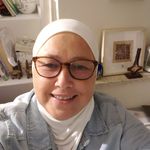How different is Levantine Arabic and Modern Standard Arabic?
How different is Levantine Arabic and Modern Standard Arabic?
That is not easy to answer. The people of Greater Syria (Syria, Lebanon, and Palestine) spoke a form of Aramaic called Syriac. Syriac is very similar to Arabic, so it wasn’t so difficult to go from Syriac (Sirriani in Arabic - Suryoyo in Syriac) to Arabic. Levantine Arabic still has some Aramaic and Syriac influences in terms of the spoken grammar and pronunciation. Some Americans learning Arabic at university claim that Levantine sounds the closest to the MSA that they learn at university, but there are still huge differences. You would just more quickly understand Levantine speakers than speakers from other countries, I would say.
Here are some differences.
1. One, is that in Levantine people don’t tend to pronounce the “Qaf” and replace it with an “Alif” sound. For example, if you say to your wife “My heart” in classical Arabic, it would by “Ya Qalbee”, but in Levantine that would be pronounced as “Ya Albee”. However, some Levantine speakers in Syria among the Alawites and Druze will pronounce the “Qaf” and same in Lebanon. Some Palestinian speakers outside of Nablus will pronounce the “Qaf” or some people will pronounce it with a “Kaf” sound. For example, some in Palestinian will even say “Kultilo” instead of “Qultilo”. Anyway, most city dwellers in the Levantine region will not pronounce the “Qaf” and will pronounce it as an “Alif”.
2. There are so many differences. Another difference is instead of saying “Ureedu” for I want, they will say “Bidee” in Palestine. Lebanese and Syrian people will tend to say “Badee”.
How are you is a bit different. Most Levantine people will say “Keefak” instead of “Kayfal Hal”. Some Syrians will also say “Shlonak”, which is something that Iraqis and Gulf Arabs also say.
3. No Levantine person will use “Leematha” when asking “Why”. They would say “Laish”. I think that derives from Lee Ay Shay “For what thing”. However, don’t quote me. I am just guessing about the origin. It’s logical, at least.
4. Instead of “Hatha” for “this”, they will pronounce it “Hada”. And if it’s the feminine Hath-ee-hee” it is “Hadee”.
5. No one “Ayna” for “Where”. It’s Wain. No one says “Ayna Anta” for “Where are you?”. It would be “Wainak?”, which sounds like “Where is your going”. I have never really thought of the origin of “Wainak”.
6. The word for water in Levantine is “M-eye” instead of “Maa”. The latter is classical Arabic, the former is the Aramaic way of saying it. If you want to say “I want water”, you could say “Biddee M-eye” if you’re Palestinian, and “Badee M-eye” if you’re Lebanese or Syrian.
7. The plural in Arabic for Egyptian people is Masree-yeen or Masree-youn depending on the grammar, but many Levantine people will say “Masarweh”. That kind of plural comes from Syriac (Sirriani).
There are books in the US that focus on Levantine Arabic written by Dr. Munther Younes. I don’t know if he’s still teaching. He has tried to make Levantine Arabic accessible. It would be good to have someone teach you some Levantine before you go say to one of those countries. You could buy one of Munther’s books and have a Levantine person go over the stuff with you.
In comparison to other dialects, it is extremely close to MSA. Many people state wrong facts that Levantine Arabic speakers swallow the “q” sound, this is by far false. Lebanese Speakers swallow the Q however most other Levantine Speakers (such as Syrian or Palestinian) do not swallow the letter “Q”. We retain all letters from MSA if you are talking in a general sense, mainly because most Arabs around the world relate Levantine Arabic to Syrian Arabic, as the Syrian dialect is the most understood dialect internationally (yes more than Egyptian, even though Egypt has more Arabic Speakers than Syria due to size, this does not mean it is not more internationally understood like most people assume).
Levantine Speakers retain words like “Keef” for “how”, or “Keefak” for “How are you?” from the MSA Vocabulary. Whereas Iraqis would use “Shlown”/”Shloonak” which means “colour” or “what is your colour”, and Egyptians would say “izay”/”izayyek” which has no relation to MSA at all.
Levantine Arabic keeps many nouns and verbs of MSA, however in speech, the formation of sentences is where it becomes different, although the words themselves if you were to pick them apart I'd say 40/50 words minimum stem from MSA, that's the best way I could describe it.
While Levantine Arabic is not extremely close to MSA (no dialect really is), is it the closest a dialect can get and is often the best dialect to learn if you want to learn MSA in the future as the similarities between them will appear so obvious in the future.
Without question, dialects from the Arabian Peninsula are closer to Classical/MSA (relatively) compared to other dialects like Levatine or Egyptian.
Especially, in terms of pronunciation of Classical Arabic letters, Levantine dialect is quite different. A good example is when the ث merges to a “t” sound.
There are numerous other examples but any claims that MSA and Levantine dialects are extremely close are erroneous.
For a cultural point of view, if you ask most Saudi or Khaliji people, they will tell you Levantine dialects, especially Lebanese is “dala3”, literally “spoiled” or “sassy” in c
25 Şubat 2019





